Published Mar 03, 2025 | 3:42 PM ⚊ Updated Mar 03, 2025 | 3:42 PM
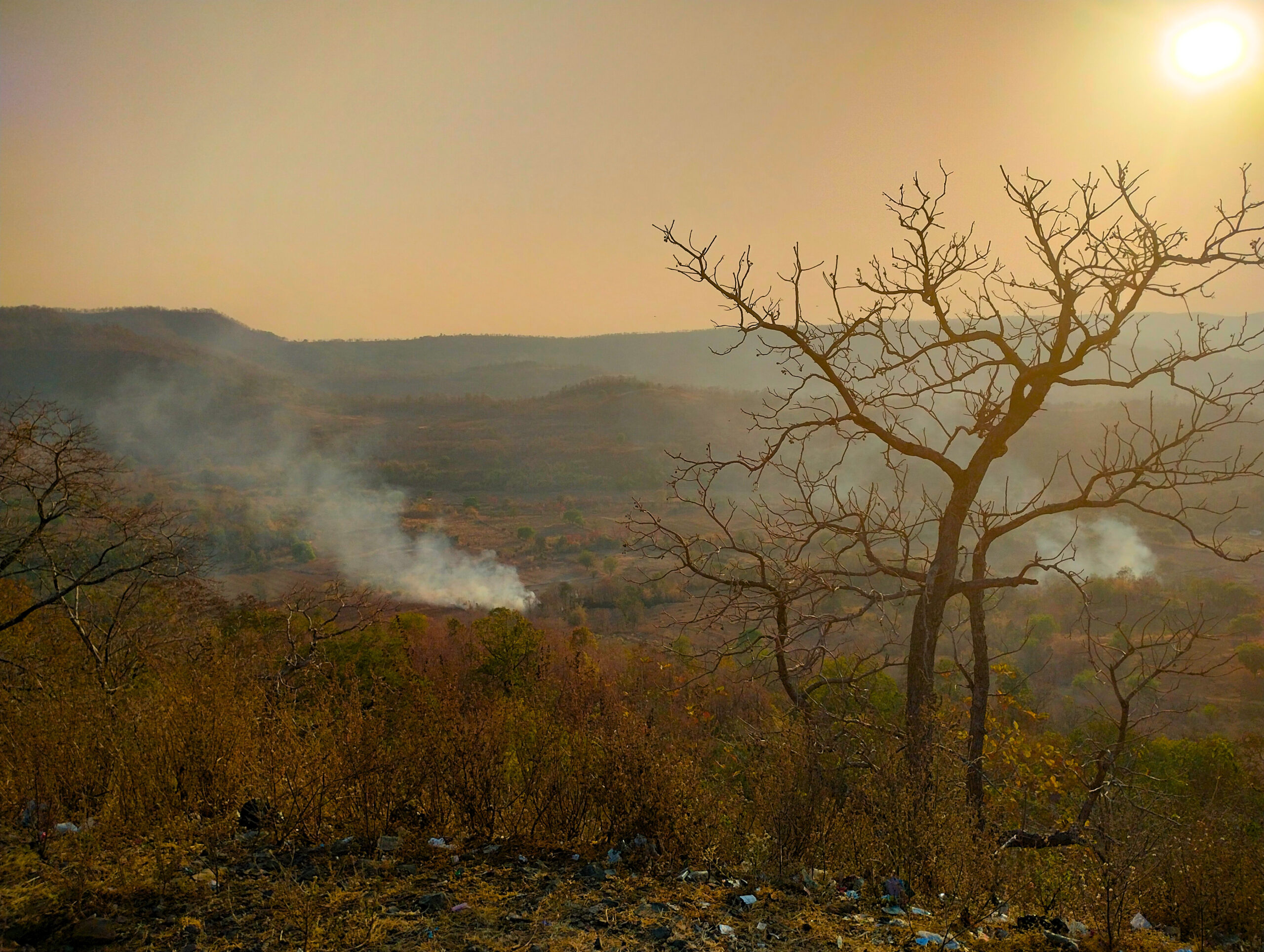
Boringguda still lacks a decent road connecting it to the outside world. Villagers said several people had died since they could not be provided medical care on time.
Synopsis: Forgotten in the backyard of the fast-paced modern time, Boringguda in Telangana’s Adilabad demands basic facilities, as the Kolam tribespeople are caught helpless between a forest that no longer belongs to them and an alien world outside.
Boringguda, a remote hamlet nestled in the rugged terrain of Telangana’s Adilabad Rural Mandal, feels like a world untouched by time.
The journey is arduous—50 kilometres of treacherous roads, half an uphill battle against loose gravel, and the other half a bumpy descent through untamed wilderness.
The village, hidden from the modern world, thrives on an ancient craft that has woven itself into the very fabric of its people’s lives—bamboo weaving.
For generations, the Kolam tribe has meticulously transformed wild bamboo into sturdy wicker baskets, intricate mats, and tough fences, their hands shaping each piece with precision honed over centuries. To them, bamboo is more than just a material; it is a legacy, an inheritance passed down through whispered lessons by firelight.
“This is all I know, all I can do,” says Aatram Kaniram, his fingers deftly slicing a fresh stalk into pliable strips. Yet, in the face of dwindling resources and shifting livelihoods, this timeless tradition stands on uncertain ground—caught between survival and slow extinction.
“We first get the bamboo and clean it. Then, we use a knife to cut it vertically into thin strips. We take the strips and then shave them off to make them flexible so that we can weave them,” 28-year-old Aatram Kaniram, a local weaver, explained.
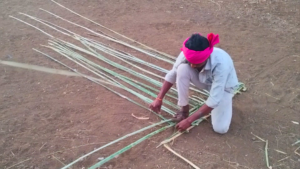
Kaniram weaving a tadka
“I then lay down the strips and begin weaving in a crisscross pattern. I learned the craft from my parents, who learned it from theirs. This is all I can do; this is all I know,” Kaniram revealed.
Like him, a majority of the Kolam tribe depends on bamboo crafts for their survival. However, for about two generations, the Kolam community had to turn to alternative income sources as well.
“Today, we Kolams are also involved in small-scale agriculture and animal rearing to supplement our income,” 31-year-old Bhimrao Madavi revealed. With a D.Ed degree, he is among the few educated people in Boringguda.
He is among the few who can speak Telugu fluently.
For the Kolams, bamboo crafts are not just a commodity to sell. They are integrated into everyday life.
“We weave tadkas, about six-arms long, and use it as a fence. We also use it as a roof, mat, and wall. Apart from that, we also use it as a basket to collect produce, to sieve rice, and to hold things. It is part of our life,” Bhimrao explained.
“However, the new generations have not been taking it up. You see, we were told to educate ourselves for a job. Now, we have education but no jobs. At the same time, we can’t make money because we don’t know the family’s profession,” he added.
While the younger generation moves away from bamboo work, the Kolams remain deeply connected to their roots through their traditions and beliefs.
The Kolams consider themselves to be among the nine major tribes of Telangana.
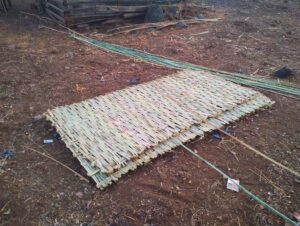
Bamboo tadka
“We are deeply religious, after all; we live off the environment around us. We believe that god gives every community one thing; ours was a flute.” Bhimrao interpreted the words of the village elders, showing a bamboo flute claimed to be over 200 years old. It is only played on special occasions.
Within the Kolams, there is a system of division. “Each family can be blessed by four, five, six, or seven gods called Sagaalu. The rule is that we must marry outside our sect to prevent marrying within the bloodline,” Bhimrao explained.
The primary deity of the Kolams is Putalayak, a god made of bamboo.
“Our culture is close to what you might find out in the city, but very distinct. Even our language, Kolami, sounds oddly familiar to multiple languages. There is a mix of Telugu, Marathi, Kannada, Tamil, and a bit of English,” Bhimrao described. Hence, the Kolams believe that bamboo crafts are a part of their culture and their identity.
The Kolams also believe that their deities do not wish grandeur. “We keep our deities in the open, they come in the form of rocks. Every time something good or bad happens, we sacrifice a rooster to thank them or plead for assistance,” he reported.
Despite a deeply ingrained sincerity towards their generational profession, the Kolams, too, have been forced to adapt.
Among the primary alternative income sources is cattle rearing. “We live in a forested area. It’s easy to find fodder for cows and goats. That makes it a viable option for us,” Bhimrao noted.
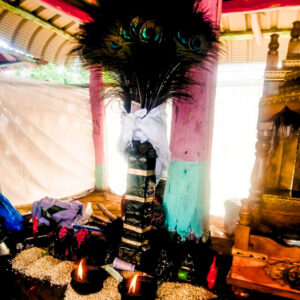
Potalayak – a Kolam deity
“The cowmilk is often used within the villages. The cow dung serves as manure. The goats are the ones which bring in money,” he continued.
“While we have a tradition of sacrificing either a goat or a chicken for our deities, we sell goats to butchers in Adilabad. It brings us about ₹8,000 every six months,” he elaborated.
Apart from animal rearing, farming is a popular go-to option for the Kolams struggling to make ends meet with just bamboo work.
“Every year, we do bamboo work until June. From then on, a lot of us were engaged in farming on little pieces of land that we own around the village. I grow wheat on my farm all by myself,” Bhimrao said.
He noted that the farmers often picked crops like cotton, wheat, and pulses to grow during this time, depending on water availability. Bhimrao also identified three primary challenges farming faces in Boringguda.
“The availability of water is a serious challenge as some people need to set up diesel engines to pump water for their farms. Another challenge is the menace of wild boars and monkeys that destroy the crops. Most farmers live in little makeshift sheds on their land when farming. Finally, there is no demand for labour. This is the only work my community can do well. However, there is no scope for farm labour in these parts,” he explained.
He reported that they benefited from two schemes specifically, the PM Kisan scheme, which gave them ₹2,000, and ₹5,000 from the Rythu Bandhu scheme, when it was still operational.
Despite these adaptations, many in the community feel a growing disconnect from the self-sufficient life their ancestors once led.
Apart from the problems the Kolams are facing as a society, Bhimrao notes that there is a more personal problem at hand.
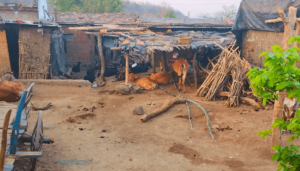
Cattle rearing is an alternative source of income for the Kolams
“My grandfather lived here in Boringguda, never having to step out. We had everything. The forest provided us with everything we needed, and we, in turn, cared for it,” he recalled.
“We got our wheat, made our bread, and ate it with the sweet tubers found around our village. Occasionally, on some occasions, we’d cook the animal we’d sacrifice. For any medical ailment, we had some local remedies. Today, it feels like I’ve given up all my wealth to a false promise,” he explained in disdain.
“Today, the Forest Department has intervened in that life. We have to buy from the market what we got for free from the forest. Our medicines are useless in the face of the new diseases that started emerging since we started buying our food. Our parents stopped eating their traditional food because their children went to school and got used to rice. The children of this village cannot eat what their parents did. That is where we are stuck,” he stated.
“I’m not saying change is bad. Modern medicine can save lives, vehicles eliminate the need to walk, and power helps us conquer the night. However, every time something new comes, it replaces the past. It’s the cost of change that bothers me,” he explained.
“My mother, Sonibhai, told me about her seven-day grand wedding. I never got to experience such a wedding,” he continued.
“Before 2021, there was ample bamboo in these forests. However, for some reason, they became scarce,” 40-year-old Sidam Maru said.
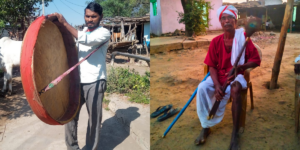
The goatskin ‘Dappu’ and bamboo flute are instruments played at special occassions
Of four children, he is the only one still working on bamboo crafts for a living.
“My children are into agriculture and cattle rearing, but this is all I know,” he added.
It takes more time to source the bamboo than to craft a tadka or basket today.
“I’ve to walk kilometers to get bamboo, about 12 km every day. I bring them back on my shoulder. I could return by afternoon when I was younger. Now, I take until evening to reach home with the bamboo,” he described.
While the availability of bamboo poses a substantial challenge, the Kolam community has also fallen prey to exploitative business practices. “We sell out tadkas for about ₹230 to a middleman. He then sells it to a wholesaler at about ₹400 a piece, who then sells it to the customer at about ₹600. They benefit more from our sweat than we do,” Maru sighed.
The market conditions have often forced the Kolam tribe to try selling their product in Adilabad or Indravelly, the closest town. Owing to the language barrier, they usually entrust educated ones like Bhimrao or Kodapa Mengu to do the business.
“We try to take our tadkas to town but are often stopped by the Forest Department officials before we can reach the town. They ask for our permits, stating that we are not allowed to do this, blocking our way and seizing our produce. Even if we get lucky and make it past them to the town, we have no space to sell. If we try selling on the road, the police ask us to vacate the place,” Mengu revealed.
“Most of my generation has already opted for education over the craft. The few who remain are not likely to take it forward. At most, I think this bamboo work will survive for two more generations in Boringguda,” Bhimrao predicted, noting that the profession’s death was imminent.
Even as the age-old profession is seemingly drawing to a close, the conditions in Borngguda remain the same.
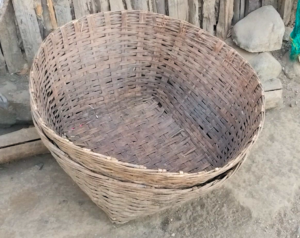
Bamboo basket
“During NTR’s regime, we saw a proper roof over our heads for the first time. Subsequently, we also got a foundation for our house, making it sturdier during harsh weather conditions. For this, our whole village is thankful to him; we consider him a godsend,” 80-year-old Bhimrao Madavi (Bhimrao’s uncle) said.
“In the later years, during YSR’s regime, a few houses were also able to replace Tadka walls with brick walls, although it didn’t cover the entire village,” he continued.
Even today, houses in Boringguda have thin tree trunks for walls. Most houses are in poor condition, and one can find bricks on every corner lying unused.
“We got the name Boringguda because we were among the first villages to receive a borewell. To date, it has been the primary source of water not just for Boringguda but also for some of the nearby villages,” 31-year-old Bhimrao explained.
He added that in 2003, the government constructed a water tank. “They built the tank, but they didn’t lay any pipes. The thing built in 2003 hasn’t worked since 2003,” he joked.
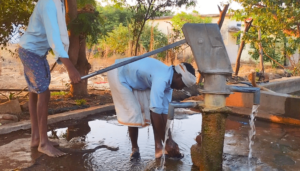
The primary source of water at Boringguda
Boringguda faces similar neglect in terms of power too.
“The only time the electricity officials ever showed up was when they were laying the power lines. Since then, we have maintained the lines. Whether they disconnect during the monsoons or the pole falls over, it is we who band together to carefully mend it,” Bhimrao stated.
“The government refuses to do its job, but power is extremely important to us,” he noted.
“We are still demanding roads, schools, and hospitals even 75 years after Independence,” Bhimrao joked.
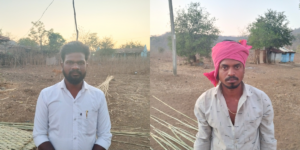
Bhimrao Madavi (left) and Aatram Kaniram (right)
To him, the first step of change lies in connecting his village to the rest of the world. “I don’t even remember the number of we’ve lost over the years since they could not reach a hospital on time due to the roads,” he said.
“While we’ve come to accept our fate to some degree, it’s during the monsoons that we feel more helpless than ever,” he stated.
Situated close to a water body, a heavy monsoon often means being locked in the village for about four months.
“We have to rely on the jeeps that transport us. Women sit inside, the men sit on the vehicle’s roof. It is unsafe, but we have no other option,” he explained.
For Boringguda, the demand for a road has often been met with inaction.
“We requested everyone. We asked the Sarpanchs to work together, the MLAs to take cognisance of the need, and even requested the MP. Yet, we got nothing. Last year, we stopped requesting. We took out a march, demanding our road, our rights. It ended in me getting slapped with a cheating case,” Bhimrao described the journey.
He said that Adilabad MLA Payal Shankar of the BJP had assured them a road before his term ends. While hopeful, a slight suspicion still lingers.
“My one-month-old son will soon be christened. Just because we are born in a far-off village, I don’t want him to be deprived of dreams. My generation has lost the ability to dream. I don’t want his future to be the same,” he noted, determined to fight for his community.
(Edited by Majnu Babu).

